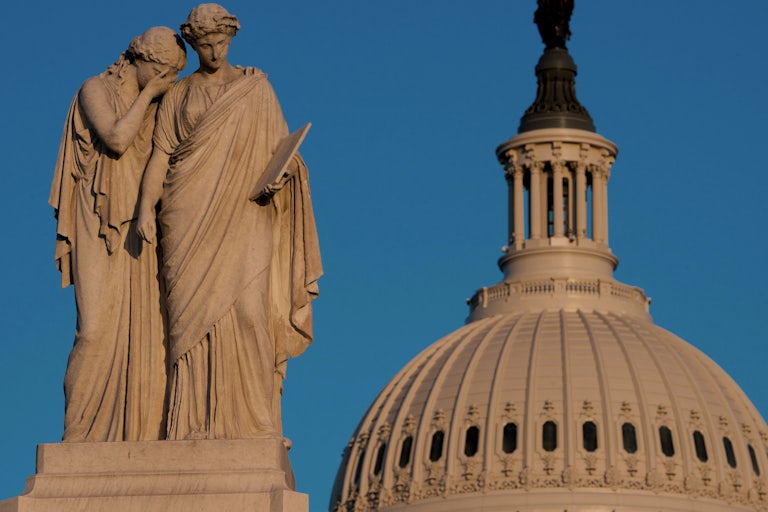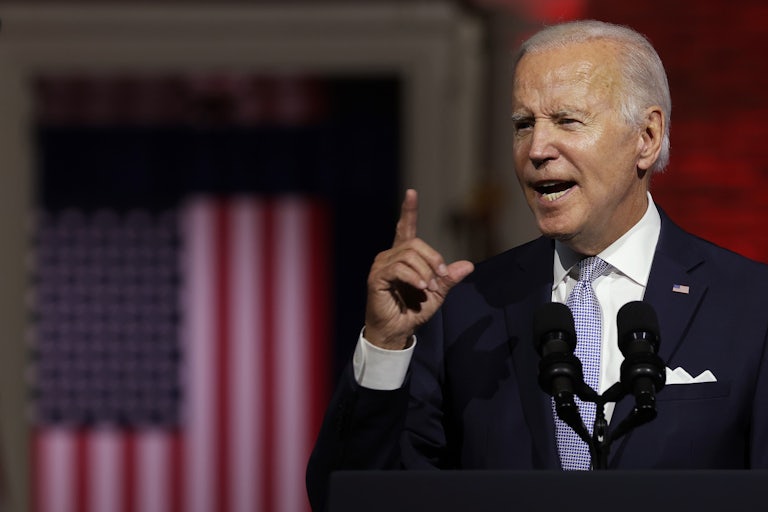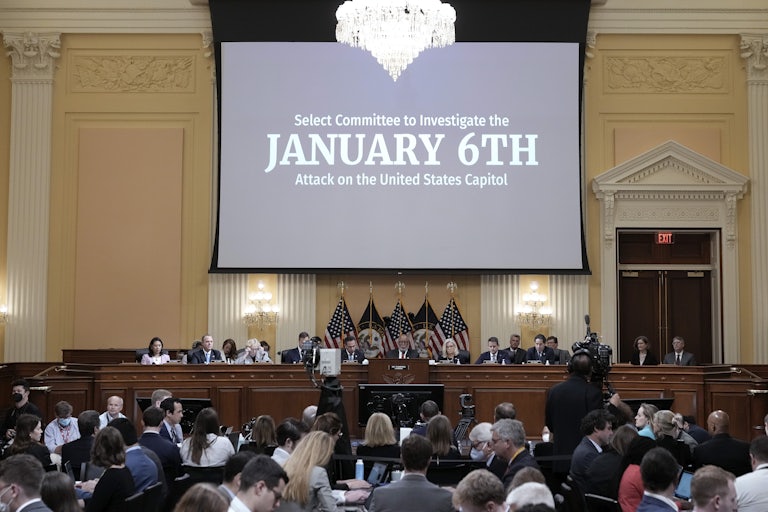The GOP’s “New Direction”: More Extremism
If you think that Republicans have learned any lessons from their disappointing midterm election showing, think again.

During the Trump era, one of the best running jokes was the media’s near-desperate search for signs that the president was shedding his obstreperous tendencies and settling into a new, earnestly presidential tone. Every moment when Trump managed not to opt for the maximally rancid reaction was one in which, perhaps, the “new tone” was taking hold, thanks to some phantasmal moderating influence that was sure to carry the day.
Alas, this dream never materialized, but that’s not to say evolution didn’t occur: Trump swiftly adopted to life as a bog-standard Beltway Republican. And his party grew more comfortable with its standard-bearer’s political aesthetics—all the better to please its base.
But now that the GOP’s big midterm ambitions have fallen apart, political touts are once again trying to conjure a “new tone” narrative into existence; one in which the Republican Party has learned the error of its ways. Some conservative luminaries, after all, have demonstrated a reluctance to fully jump back into Trump’s arms. Former Pence aide Marc Short suggested on CNN over the weekend that something new is afoot: “Since the election in 2020, [Trump] has descended deeper into the heart of darkness. It’s another reason why I think Republicans are looking in a different direction in 2024.”
There’s little doubt that Pence, who is allegedly running for president, would indeed require Republicans to look in a different direction, considering most of them think of Pence as either someone who did too much to enable Trump’s worst tendencies or someone who did too little to keep him in power. But outside of the wishful thinking of Pence and others, there is scant evidence that conservatives truly are ready to change their ways. Has everyone forgotten that Republicans and their donors went to elaborate lengths over the past two years to enact voter suppression laws and boost the political ambitions of election deniers? Because the voters sure didn’t.
More to the point, let’s recall that the context for this past weekend’s expressions of agita over Trump was his decision to break bread with two flamboyant bigots: rapper Kanye West and far-right media gadfly Nick Fuentes. Here was a golden opportunity for this change in direction: Trump’s presidential rivals were gifted the chance to jump into an “at least I’m not a rabid antisemite” lane ahead of the shadow primary.
Sadly, that lane remains unoccupied by any would-be 2024 aspirants. At least one Republican whose 2022 electoral fate remains hanging in the balance, Herschel Walker, is still mum on the matter of whether it was a good idea for Trump to dine with these reprobates. And it took the rest of the Republican Party a number of days to finally register some mealy-mouthed condemnations of Trump’s antics. This is hardly a surprise: An October 6 tweet from the GOP’s House Judiciary account—reading “Kanye. Elon. Trump”—gave proof through the midterms that Republicans were excited to get in on the ground floor of Kanye West’s antisemitism. (That tweet was finally taken down on Thursday shortly after West expressed an affection for Adolf Hitler during a lengthy interview on Alex Jones’ Infowars.)
Fuentes and West may never become keynote speakers at CPAC, but they’re in a decaying orbit around a party that already countenances no end of grotesqueries, from Viktor Orbán’s stoking of authoritarianism to the now regular evocations of the racist “great replacement theory” on Fox News’ prime time. And the person thought to be the heir to Trumpism, Ron DeSantis, has, if anything, grabbed Trump’s baton and sprinted off in the same direction. As Jonathan Chait recently noted in New York magazine, DeSantis “would reify [the GOP’s] Trump-era transformation” by “preserving” Trump’s extreme coalition of “QAnon supporters and insurrectionists.” DeSantis’s constant anti-LGBTQ rhetoric is central to his appeal; he has already emerged as the “Pizzagate in every city” candidate.
We needn’t wait for DeSantis, though. As The Washington Post’s Karen Tumulty notes, the Republican rot is deep in Washington already: “Come January, there will be fewer Republicans left in Congress willing to speak out when Trump does what he keeps doing.… And those who have followed Trump’s example in associating themselves with extremists and their ideas will have more clout within the institution.” And if you’re looking to see exactly how concerned the Republican Party is about its poor midterm showing, the good news is that the RNC is empaneling a team to examine what went wrong. The bad news is that Blake Masters, a 2020 election denier who spent a large part of his Senate campaign cosplaying as a serial killer, is one of those tasked with divining what went wrong. Yep, folks, they’re all just trying to find the guy that did this.
There is a nonzero chance that Trump’s bid to reclaim the throne will come to naught. But let’s be real: Republicans aren’t clamoring for a moderate to take this party in a new direction. “Never Trumpers” are still verboten in the GOP, and no one within that clan seems to actually have any plan to recapture the party’s institutions, aside from heaving op-eds at it. The Republicans coming to Washington plan to stage mock trials of Hunter Biden and use the debt ceiling as a weapon to try to enact radical cuts to Social Security.
As TNR contributor Graham Gallagher recently explained, the educated elites in this party have become decadent and off-putting weirdos, in thrall to bizarre and un-American ideas that seem custom-designed to turn the stomachs of normal people. Meanwhile, the conservative movement’s media propaganda organ is regularly bleating out the same kind of rhetoric as embarrassment du jour Nick Fuentes. So are Republicans really looking for something new? The only direction this party is headed is toward the gutter; the only question is who in the media, expecting a “new tone” or a “change in direction,” will get dragged there with them.









